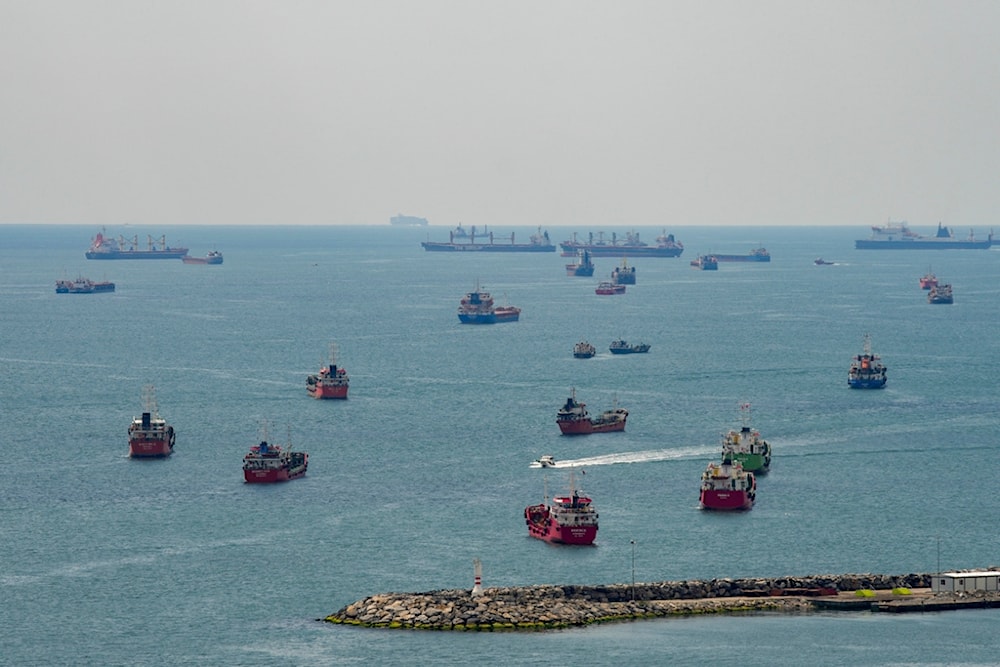US raises tariffs on Chinese goods to 245%
The new announcement suggests a 100 percent increase in US tariffs, though no formal breakdown has yet been offered to explain how the cumulative 245 percent figure is calculated.
-

Cargo ships are anchored in the Marmara sea as they await to cross the Bosphorus, in Istanbul, Turkey, Sunday, April 13, 2025 (AP Photo/Emrah Gurel)
The trade war between the United States and China has intensified, with Washington announcing new tariffs that could see duties on Chinese imports soar to as high as 245 percent. The White House attributed the move to Beijing's "retaliatory actions," signaling a hardening stance in the ongoing economic conflict.
Alongside the tariff hike, US President Donald Trump authorized an investigation into the national security implications of America's dependence on imported critical minerals such as cobalt, lithium, nickel, and rare earth elements, which are key components in electric vehicle batteries and other technologies. The administration stated that this reliance leaves the country vulnerable to "serious, sustained, and long-term supply chain shocks" and introduces potential "risks to national security."
Previously, Washington had imposed a 145 percent levy on Chinese goods, while Beijing responded with a 125 percent tax on American exports. The new announcement suggests a 100 percent increase in US tariffs, though no formal breakdown has yet been offered to explain how the cumulative 245 percent figure is calculated.
In response, a senior Chinese official criticized the impact of US trade measures, stating they are placing "pressure" on China. Still, Beijing reported stronger-than-expected economic results for the first quarter, including 5.4 percent GDP growth, a 6.5 percent rise in industrial production, and a 4.6 percent boost in retail sales over the past year. Despite these positive figures, Chinese authorities warned that global economic conditions are becoming "more complex and severe" and emphasized the need for further efforts to bolster domestic consumption and growth.
Foreign Ministry spokesperson Lin Jian condemned Washington's approach, saying, "If the US really wants to resolve the issue through dialogue and negotiation, it should stop blackmailing and talk to China on the basis of equality, respect and mutual benefit."
Trump, for his part, insisted that Beijing must initiate any further talks. "The ball is in China's court. China needs to make a deal with us. We don't have to make a deal with them," he said, reiterating claims that China had reneged on a major Boeing agreement.
Tariff Spiral
Tariff reciprocity has been a recurring theme in Trump's economic messaging. He has frequently accused nations including China, India, and Brazil of imposing heavier duties on US goods than the US applies to their exports. Since early this year, his administration has introduced multiple new levies, including a general 10 percent tariff on several trade partners and specific charges on Chinese goods—among them, a 20 percent tax linked to fentanyl concerns and a 125 percent duty for what the US describes as unfair trade conduct.
The accumulation of tariffs had already pushed the total duty rate beyond 100 percent by early April, causing significant volatility in global financial markets. Although some measures have been temporarily paused, none of those suspensions have involved China.
China has responded with its own set of countermeasures, including halting imports of sorghum, poultry, and bonemeal, enforcing trade restrictions on 27 American companies, and filing a formal complaint with the World Trade Organization. The WTO has warned that the current standoff could have "severe negative consequences for the world," estimating a 0.2 percent drop in global merchandise trade in 2025, with possible downside risks reaching as much as a 1.5 percent contraction.
Read more: China says 'not afraid to fight' a trade war with the US
Seeking to build international support, Beijing has turned to other major economies. During a recent diplomatic engagement, Chinese Foreign Minister Wang Yi encouraged deeper ties with India, proposing that the two nations "make elephant and dragon dance" and take joint leadership in opposing "hegemonism and power politics." China also extended an invitation to the European Union to cooperate in resisting "unilateral bullying" by the United States, reinforcing President Xi Jinping's call for a united defense of global justice and fairness.

 4 Min Read
4 Min Read









